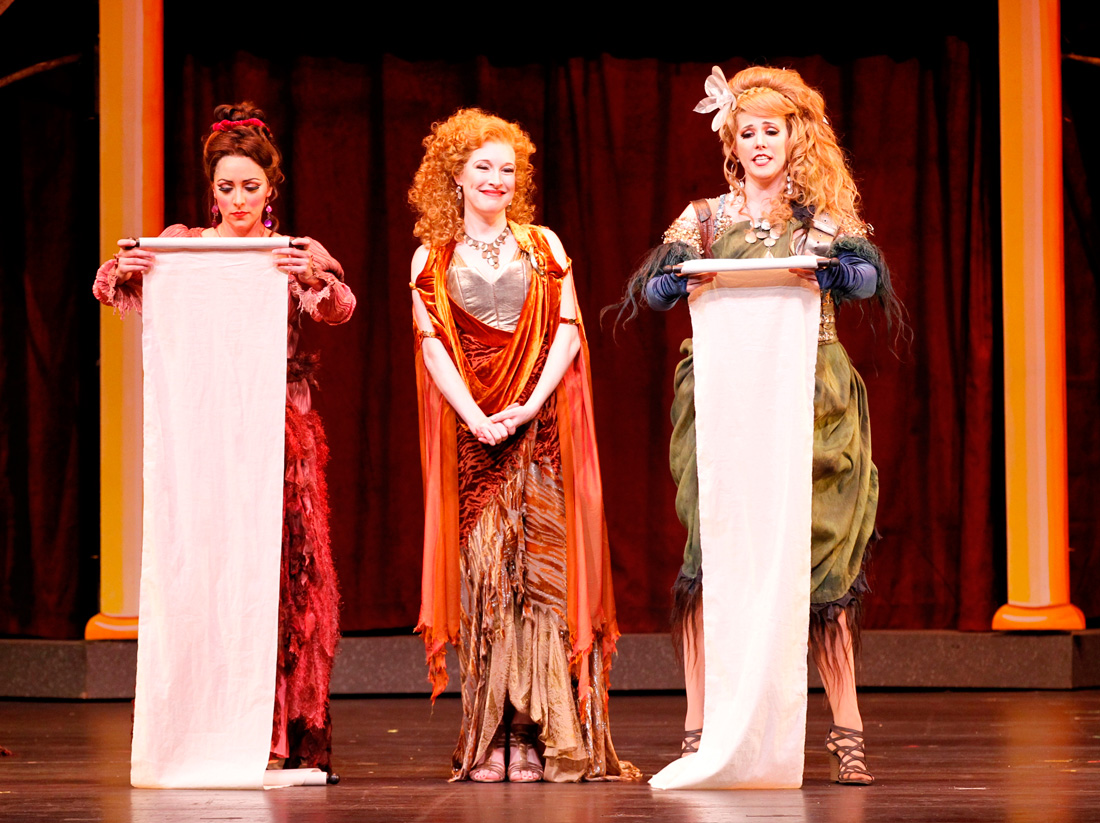For most of the second act of Mark Adamo’s Lysistrata, or The Nude Goddess, most of the men on stage have gigantic, visibly bulging erections. That’s the first thing you need to know about this opera version of Aristophanes’ comedy. Maybe it’s the only thing you need to know. This much is certain: You don’t see a lot of that at the opera house.
Fort Worth Opera’s commitment to new works continues with this frisky production of Adamo’s work. The composer came to prominence in 1998 with his opera version of Little Women. His Lysistrata debuted seven years later in Houston. Even though the original Greek stage play enjoyed a spate of new theatrical productions after the outbreak of the Iraq war, Adamo’s opera goes in for bigger statements on the nature of war and sexual power instead of bothering with topicality. (FWO’s staging gives one tip of the hat to current events, though: The Athenian war protesters hold up picket signs, one of which reads “Occupy Athens.”) Acting as his own librettist, Adamo adds freely to the source play, which is about a group of women in Athens and Sparta who band together to end the war between their states by withholding sex from their husbands. The heroine who comes up with the big idea is named Lysia in this telling, only receiving the name Lysistrata after her victory.
Adamo’s work is structurally ingenious, with themes often being restated in powerful new contexts, most notably Lysia’s early rant directed at her boyfriend, in the aria “You’re not my own,” which later turns into “I’m not my own,” a reflective aria on how she’s been made into a heroine. That last aria is lovely, but it indicates some of the issues that the opera runs into in the late going. The composer wants to go deeper than Aristophanes by suggesting that it takes more than clever social protest to end war. That’s a great notion, but it goes wrong in the execution, as the comic energy of the first act and the beginning of the second gives way to a horror that’s then erased by the gods coming down from heaven (a literal deus ex machina) and restoring the dead to life. This is a tricky thing to handle tonally, and Adamo isn’t equal to it. He does pretty well with the tone before that, leavening the hijinks with lyrical bits of unexpected beauty. The ensemble for the women as they pay tribute to Lysia’s courage (and to the men they’ve lost) late in the opera is a deeply moving piece of music. The newly rechristened Lysistrata can only stammer, “I … I …” before collapsing into an overwhelmed, anachronistic yet somehow perfect wail of “Ay yi yi.”
That’s the most important thing about this comic opera: It’s really funny. Adamo’s rhymes range from brilliant to unfortunate, hitting every point in between, but the jokes don’t stop with the libretto. They extend to the score; when Lysia hears the war drums and exasperatedly sings, “Stop that drumming!” the timpani in the orchestra dutifully stop. The beginning of the second act is downright uproarious, with the men permanently tumescent after several weeks of protest and the women rather irritable and anxious themselves. The most inspired comic creation is Lampito, the leader of the Spartan women, who issues severe proclamations in an accent that combines Zsa Zsa Gabor and Elmer Fudd. She is played straight-facedly here by statuesque mezzo-soprano Alissa Anderson, whose commanding presence (she’s taller than any of the men on stage) only makes her pronouncements all the more risible.
She’s only one standout in a cast that’s quite strong vocally and dramatically. Baritone Michael Mayes wields a dreadnaught-class voice as an Athenian commander, and he matches up well with the attractive soprano of Ashley Kerr as his girlfriend who’s among Lysia’s protesters. Still, the proceedings are pretty well dominated by an incandescent Ava Pine in the lead role. Those who remember her as The Angel in Fort Worth Opera’s production of Angels in America a few years back will be struck by her loose-limbed, sexy performance as a funny, earthy woman who finds herself thrust into a bigger role in history. The singers’ efforts are augmented by a simple but effective staging by director David Gately, who switches easily between the settings of the Acropolis and the warring camps in the battlefield. Conductor Joe Illick has a great deal of fun with the score but brings the Fort Worth Symphony Orchestra to a proper froth during the opera’s bigger moments
Oh, and if you were wondering about the opera’s subtitle, a goddess does indeed show up in Lysistrata, though she isn’t actually nude. Oh, well. She’s still worth looking at, much like the rest of this production.
[box_info]
Lysistrata, or The Nude Goddess
Thru Sun. Bass Performance Hall, 555 Commerce St, FW. $18-180. 817-731-0833.
[/box_info]












